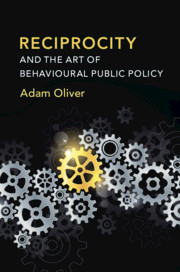Book contents
- Reciprocity and the Art of Behavioural Public Policy
- Reciprocity and the Art of Behavioural Public Policy
- Copyright page
- About the author
- Dedication
- Contents
- Figures and Tables
- Preface
- Acknowledgements
- 1 Setting the Scene
- 2 Animals and Infants
- 3 A Pinch of Anthropology
- 4 A Dash of Behavioural Economics
- 5 The Domain of Reciprocity
- 6 The Dark Side of Reciprocity
- 7 Nurturing Reciprocity in Public Policy
- 8 Reciprocity-Informed Policy Design
- 9 Towards a Political Economy of Behavioural Public Policy
- 10 Summing Up
- References
- Index
5 - The Domain of Reciprocity
Published online by Cambridge University Press: 06 July 2019
- Reciprocity and the Art of Behavioural Public Policy
- Reciprocity and the Art of Behavioural Public Policy
- Copyright page
- About the author
- Dedication
- Contents
- Figures and Tables
- Preface
- Acknowledgements
- 1 Setting the Scene
- 2 Animals and Infants
- 3 A Pinch of Anthropology
- 4 A Dash of Behavioural Economics
- 5 The Domain of Reciprocity
- 6 The Dark Side of Reciprocity
- 7 Nurturing Reciprocity in Public Policy
- 8 Reciprocity-Informed Policy Design
- 9 Towards a Political Economy of Behavioural Public Policy
- 10 Summing Up
- References
- Index
Summary
In the specific design of public policy interventions, reciprocity, somewhat strangely, has until relatively recently been largely overlooked as a key motivator of human behaviour. Rather, the debate on public sector governance and human motivation has tended to focus on the dichotomy of pure altruism and selfish egoism, with the latter generally winning out over recent decades, because the egoism that some have interpreted as being essential to achieve efficiency in the economic exchange has also been embraced by many as applicable to social exchanges. Yet this chapter argues that when we examine the writings of the classical economists we find that over complex goods with much asymmetry of information, the assumption that people either should be or are selfish egoists is not integral to efficient economic exchange, let alone social exchange. The modern supporters of using egoism to inform the design of public policy may contend that this admittedly ever-present aspect of human behaviour can be harnessed to positive ends, but by legitimising egoism we will perhaps crowd out reciprocal altruism, to the detriment of group cooperation.
- Type
- Chapter
- Information
- Reciprocity and the Art of Behavioural Public Policy , pp. 76 - 92Publisher: Cambridge University PressPrint publication year: 2019

